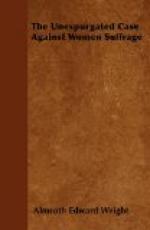The preponderating majority of the women who claim the suffrage do not do so from motives of public interest or philanthropy.
They are influenced almost exclusively by two motives: resentment at the suggestion that woman should be accounted by man as inherently his inferior in certain important respects; and reprehension of a state of society in which more money, more personal liberty (In reality only more of the personal liberty which the possession of money confers), more power, more public recognition and happier physiological conditions fall to the share of man.
A cause which derives its driving force so little from philanthropy and public interest and so much from offended amour propre and pretensions which are, as we shall see, unjustified, has in reality no moral prestige.
For its intellectual prestige the movement depends entirely on the fact that it has the advocacy of a certain number of distinguished men.
It will not be amiss to examine that advocacy.
The “intellectual” whose name appears at the foot of woman’s suffrage petitions will, when you have him by himself, very often Make confession:—“Woman suffrage,” he will tell you, “is not the grave and important cause which the ardent female suffragist deems it to be. Not only will it not do any of the things which she imagines it is going to do, but it will leave the world exactly where it is. Still—the concession of votes to women is desirable from the point of view of symmetry of classification; and it will soothe the ruffled feelings of quite a number of very worthy women.”
It may be laid down as a broad general rule that only two classes of men have the cause of woman’s suffrage really at heart.
The first is the crank who, as soon as he thinks he has discerned a moral principle, immediately gets into the saddle, and then rides hell-for-leather, reckless of all considerations of public expediency.
The second is that very curious type of man, who when it is suggested in his hearing that the species woman is, measured by certain intellectual and moral standards, the inferior of the species man, solemnly draws himself up and asks, “Are you, sir, aware that you are insulting my wife?”
To this, the type of man who feels every unfavourable criticism of woman as a personal affront to himself, John Stuart Mill, had affinities.
We find him writing a letter to the Home Secretary, informing him, in relation to a Parliamentary Bill restricting the sale of arsenic to male persons over twenty-one years, that it was a “gross insult to every woman, all women from highest to lowest being deemed unfit to have poison in their possession, lest they shall commit murder.”
We find him again, in a state of indignation with the English marriage laws, preluding his nuptials with Mrs. Taylor by presenting that lady with a formal charter; renouncing all authority over her, and promising her security against all infringements of her liberty which might proceed from himself.




